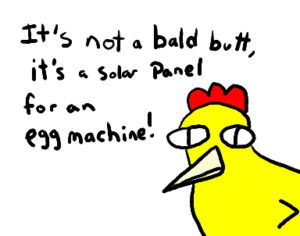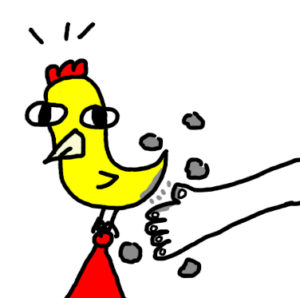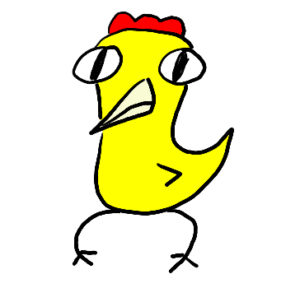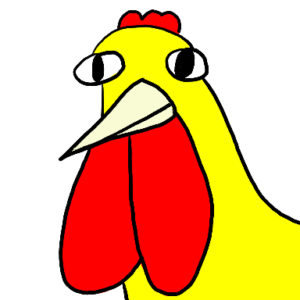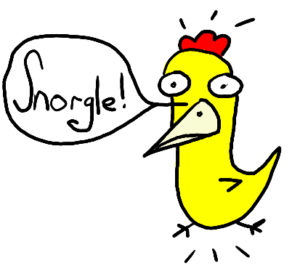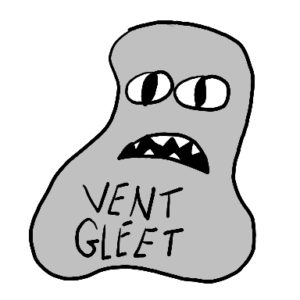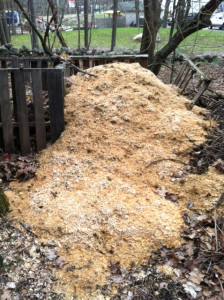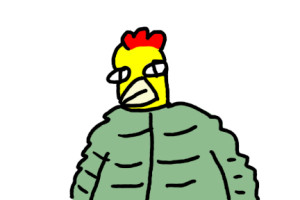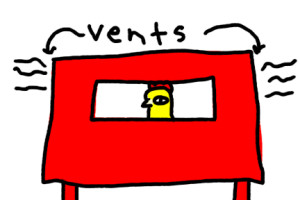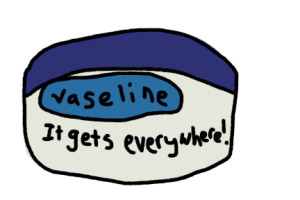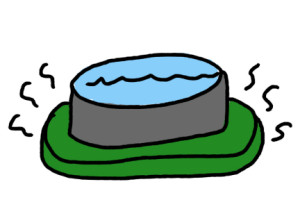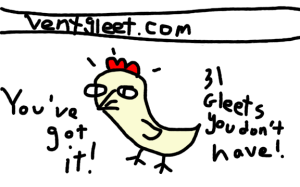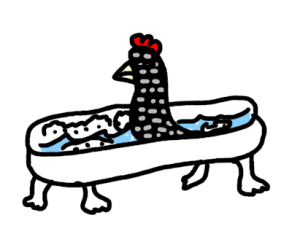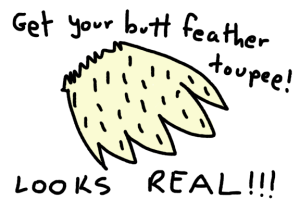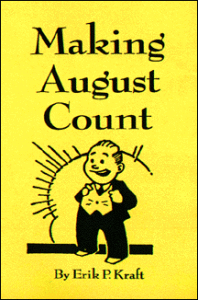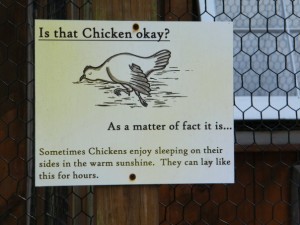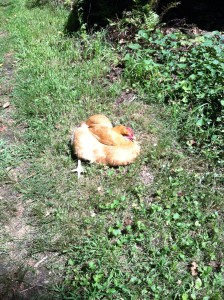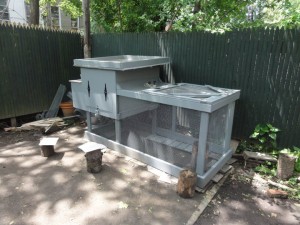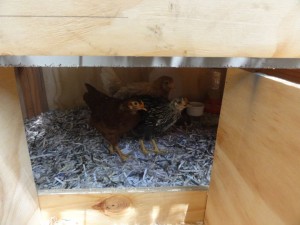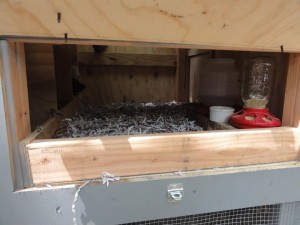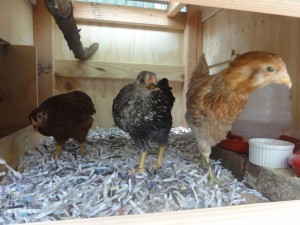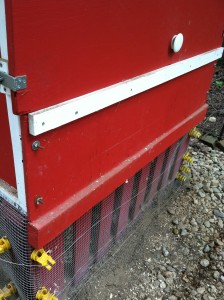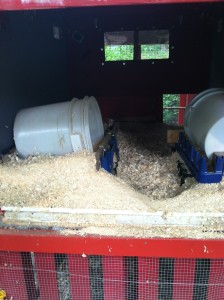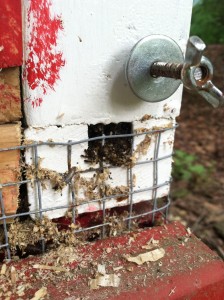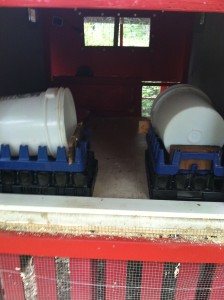I don’t know, doc. When I first got my chickens a couple of years ago, I was very excited to get some eggs. I had gotten the chickens to eat the ticks in my yard, but egg laying was an extra bonus. Vermin control that comes with breakfast should be the standard. Mouse trap companies should be hiring me for this stuff, man. If they threw a bagel in the package, they could be throwing huge piles of money at me, right? The thing about chickens is that they are ready to eat ticks much sooner than they are ready to lay eggs. So while they were out there laying waste to the tick population in the yard, I was wondering when they were going to lay eggs for the human population of the house.
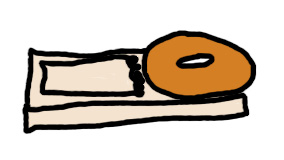
You’re supposed to eat the bagel, but I guess this works too.
What? My mother? What does she have to do with this? We’ve already talked about her. No, you’re always trying to drag her into it. Fine, yes. My mother had taken a particular interest in my chicken project, and yes, when my mother takes an interest, my mother asks questions. And when my mother asks questions, she asks a lot of them. And she sometimes asks them all the time. And this is what she did when we were wondering when the eggs would come. Chickens generally start laying eggs when they are six months old, but everyone’s different. Some may start sooner, some may start later, but when you’re in the middle of the general time frame, and there are no eggs, the pressure’s on. I was excited for it, and my mom was excited for it, and it seemed like every day after month 6 she asked if I had eggs yet, and every day I had to disappoint her. Like I always do. Until that glorious day when I finally found an egg in the coop, and we could go back to living our lives like normal people. Yes, normal people who have chickens for eating ticks.
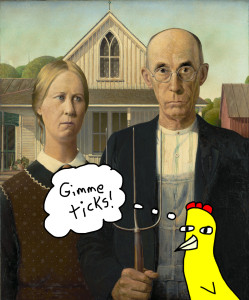
Iconic.
This year my mother got into the chicken lifestyle herself. We split an order of chicks, and so she looks after three little ones, Gladys Knight and the Peeps. We got them slightly later than I had gotten my original chickens, late June instead of early June, but I knew December was our six month line, and “eggcitement” was going to kick in. No, I was not wrong. This time around, though, there was less pressure on me, since she had her own chickens to worry about. She would occasionally ask if mine had laid any eggs yet, and then confirm that December should be the time, but I felt much less harassed this time around. I can’t say what her chickens went through, though. Are there therapists for chickens? They might need it. Do chickens get neurotic? “After all I’ve done for you! I bring you food, I clean your poop, I give you shelter, and I don’t even get any eggs for my troubles!” Whatever did go on, they didn’t seem to mind, since they follow her around wherever she goes in the yard, though, maybe that’s just out of guilt. But it sounds like she did something right. Mine regard me with vague suspicion, and really only stick around because I’m the guy with the treats.
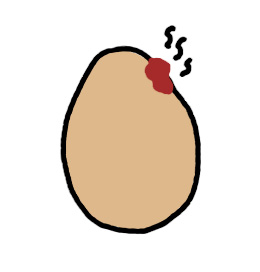
Sometimes the eggcitement comes with added eggscrement.
Her first egg came right around Christmastime, which was probably one of the better presents she got. Since then, she’s gotten eight total, and she’s convinced it’s the littlest Peep who’s been laying them all. I’m not sure how she came to this conclusion, but I will admit that a lot of my chickening isn’t exactly scientific either. I can tell which egg came from which breed I have, but unless you catch them in the act, there aren’t really egg fingerprints, which I suppose technically would be cloacaprints, what? I told you, it’s their butt/egg hole. No, I don’t have cloaca envy, thank you very much. Anyway, until it’s clear they’re all laying, she can develop whatever theories she wants. She was a little nervous to take on this project at the start, but has since totally gone cuckoo for chickens, even before the eggs arrived. Now that they’re here, she’s even more into it. Meanwhile, I’ve only gotten one egg from one of my new chickens. I guess that also gives her something to feel good about. She’s leaving me in the dust, egg-wise, because I can never do enough. I had chickens first, I taught her everything she knows about chickens, and yet here I am with one lousy egg to her 8. She texts me every time she gets a new egg, and my chickens can hear when I get a text, and they know what that sound means. Yes, I know that this is not a competition, but why can’t I ever come out on top for once? What do I have to do to . . . oh, time’s up? See you next week, then. NO, I don’t know when I’ll have eggs for you.
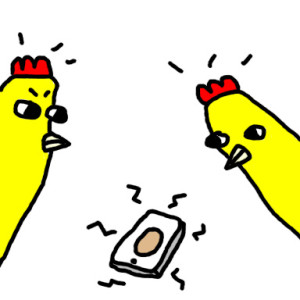
I ought to just put them on my family plan.
(The voice I use to imitate my mother is for comedy purposes only. My mother is a good sport (I hope). Hi mom!)
(Also, thanks to Wren Ross for her always helpful guidance, but particularly insightful suggestions on this one.)
(CREDITS: Theme music: Chicken In The Barnyard by Fireproof Babies, Music Bed: Childhood Memories by Beluga Ten, kitchen timer sound by maphill (with some looping on my part), and the ding sound effect by JohnsonBrandEditing)
Like this:
Like Loading...
!["[T]here is no common agreement as to whether Kant pursues a single unbroken line of argument in this work, and, if he does, what that line of argument is."](http://www.toomanychickens.net/wp-content/uploads/2016/09/reading-chicken.jpg)

